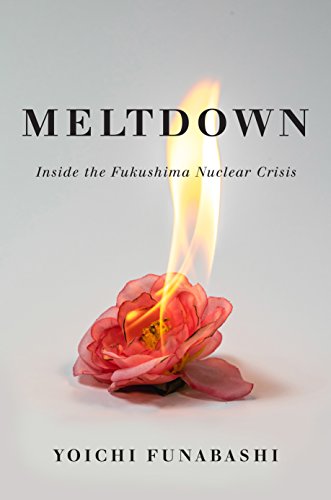Meltdown
Inside the Fukushima Nuclear Crisis
Yoichi Funabashi
BOOK REVIEW

On March 11, 2011, Japan faced one of the most harrowing disasters of the modern age - the Fukushima nuclear crisis. This catastrophic event not only shook the foundations of the country but rippled fear and uncertainty across the globe. In Meltdown: Inside the Fukushima Nuclear Crisis, Yoichi Funabashi plunges into this dark chapter of history, meticulously peeling back the layers to reveal the intricate web of decisions, reactions, and consequences that brought Japan to its knees.
Funabashi, a seasoned journalist and former editor-in-chief of the Asahi Shimbun, uses his profound understanding of the political and cultural landscape of Japan to weave a narrative that is both compelling and vital. This isn't just a recounting of events; it's an urgent call to recognize the fragility of modern society against the backdrop of technological advancement and human error. The author's exploration of the government's missteps and the bureaucratic red tape that exacerbated the disaster unfolds like a tragic opera, making you question the very fabric of authority and safety that we often take for granted.
Diving into the raw emotions of that fateful day, Funabashi doesn't shy away from the horror that gripped the nation. He captures the terror of ordinary citizens, the chaos within nuclear facilities, and the heroes who emerged amidst the despair. The reader feels the heartbeat of a nation in crisis-fear, confusion, and resilience collide in a symphony of emotions that resonates deeply. To ignore this vulnerability is to ignore a crucial lesson of our times.
Critics have praised Funabashi's keen eye for detail and his ability to convey complex technical information in an accessible manner. The book serves as a bridge, connecting the reader not just to the events of 2011 but also to the ongoing debates surrounding nuclear energy and disaster preparedness. As you read, you're drawn into the ethical labyrinth of energy dependence, environmental responsibility, and governmental accountability. How far should a society go in the name of progress? Each page ignites questions that linger long after you've closed the book.
Readers express a mix of admiration and unease in their reflections. While many laud Funabashi's thorough research and gripping storytelling, some feel that his approach might seem overly critical of the Japanese government. The haunting realities of mismanagement and the faceless bureaucracy may provoke feelings of anger or frustration. Yet, isn't this the very purpose of such narratives? To confront the uncomfortable truths that we'd rather not acknowledge?
As the world grapples with its own energy crises and the aftershocks of climate change, Meltdown serves as a stark reminder of the stakes involved. Funabashi's work questions not only how we prepare for disasters but also how we navigate the murky waters of trust in those we elect to lead us. This book is a wake-up call, compelling us to engage with the failures of past governance as a means to forge a more responsible future.
Yet, the voices of the affected, the haunting silence of evacuation zones, and the stories of resilience speak louder than any critique. Funabashi humanizes the statistics, transforming numbers into narratives that will resonate for generations. The impact of his insights reaches far beyond Japan; it reverberates through the global community, reminding us of our interconnectedness in the face of calamity.
The allure of Meltdown lies not just in its documentation of a disaster but in its exploration of the indomitable spirit of humanity. It urges readers to confront their own vulnerabilities and to rise for accountability, resilience, and a future where we prioritize safety over convenience. This is not merely a book about a crisis; it is a profound meditation on what it means to be human in an age where disasters-man-made or natural-loom ever closer.
In a world still wrestling with echoes of Fukushima, Funabashi's work is a masterclass in storytelling and a crucial lesson for leaders, policymakers, and citizens alike. Dive into Meltdown, and you might just uncover a new perspective on responsibility, governance, and the sheer unpredictability of our existence.
📖 Meltdown: Inside the Fukushima Nuclear Crisis
✍ by Yoichi Funabashi
🧾 622 pages
2021
#meltdown #inside #fukushima #nuclear #crisis #yoichi #funabashi #YoichiFunabashi